DOTA 2 Review
The best thing about DOTA 2 is its player vs player action. The worst thing about DOTA 2 is its player vs player interaction.
This article first appeared on USgamer, a partner publication of VG247. Some content, such as this article, has been migrated to VG247 for posterity after USgamer's closure - but it has not been edited or further vetted by the VG247 team.
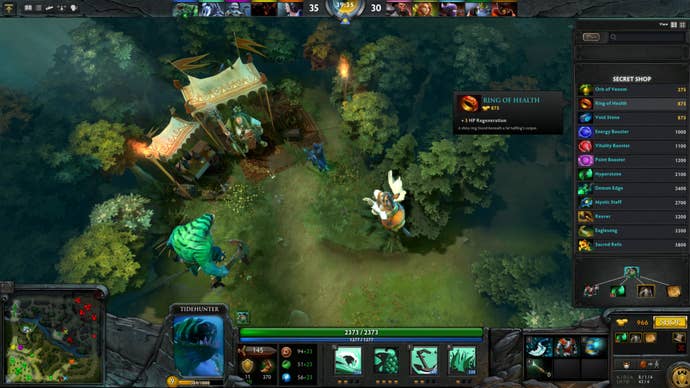
Jaz Rignall, Editorial Director
A few weeks ago, I was a DOTA virgin. I'd never played it, and had little understanding of what it was all about. But following a lunchtime conversation wth 600-plus-hours-of-playtime-expert Cassandra, her boundless enthusiasm persuaded me to take the plunge.
I documented my experience as I played through the game's fairly solid training mode in our DOTA 2 LiveTopic, and evolved from clueless idiot to idiot with a clue. Following a week of playing with actual human beings, I'm now fully grounded in the game's fundamentals, and am looking forward to mastering its subtleties and nuances in my quest to become an adept DOTA player.
What immediately strikes me about DOTA – to coin a hideously over-used cliché – is that it's easy to learn, but difficult to master. It's a phrase oft bandied about, but in this case it perfectly describes DOTA's very simple concept and goals – which take mere seconds to understand – and its phenomenal gameplay variability and strategic depth – which offer enormous scope for skills development.
It delivers by doing what every truly great PvP game should do – and that's provide its players with an even playfield to work on, a robust set of rules, and a suite of characters available to all that enable deep and rich tactical play. It's an archetypal sporting construct that ensures fair competition, where winning is all about skill, expertise and experience – and maybe just a little luck every now and then.
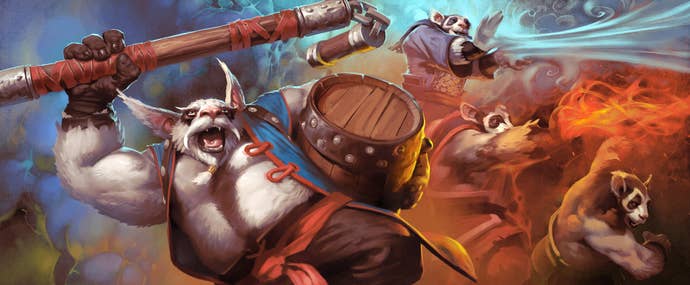
Many PvP games don't quite do that, and instead enable player advantage through investment of time and/or money. I'm fine with that – in World of Warcraft, my hard-earned top-level gear lets me crush newbies mercilessly. But while rofflestomping nubs after a long day can be fun, there's nothing quite like a system built around player parity to drive the most fierce and rewarding competition.
Something that's important to me in PvP is the facilitation of preferred playstyles through character roles, and DOTA ticks that box nicely. In team PvP, I'm most attracted to a support function, and I'm very happy with DOTA's wide array of characters that let me play behind the front-runners, making sure they stay alive. I'm already seeing other roles I want to try too, but for now, it's great being able to learn a game in a role that makes me feel like I'm playing from my core strengths, rather than feeling like a square peg in a round hole.
For me, multi-role gameplay makes for varied and interesting play both for pick-up games, and pre-made coordinated team competition. Does the team go all out offense? What about defense? Should the team be balanced, or not? DOTA enables high flexibility in that regard, so it's down to the players to follow through on their tactics, or adapt accordingly. Again, that makes for involving, interesting and fun gaming. It's not just a slug-fest or shooting match: it's more subtle, strategic and measured.
Which brings me to the cadence of the game. Some PvP games are frenetic, and require practice simply to attune one's brain to the pace of the action. DOTA 2 does not. While it certainly does have its frantic moments, they are interspersed with quieter periods where you're moving to the next tactical location, or perhaps sitting back to heal or regroup. Having this space to breathe is really enjoyable, and while you have to still keep your guard up to ensure you're not ganked by some stealthy foe, it's generally more forgiving that most PvP games, and gives you plenty of bandwidth to learn, rather than feeling rushed and panicked the whole time.
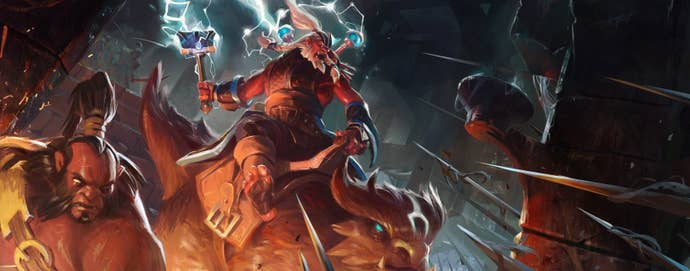
But while the game is generally forgiving, the players are much less so. As with all multiplayer games, the experience of playing with others can be a bit of a mixed bag. Early on I had a few matches where my n00biness got me called out a few times, and seemed to enrage one particular person to the point of apoplexy – probably exacerbated by us losing badly. While I've been PvPing long enough to know that this is part of the landscape, I was nevertheless annoyed that I was playing with people who were clearly leagues ahead of me in terms of ability. Perhaps the matchmaking bands are too broad, but as I've been developing my skills, I have found myself consistently feeling like I'm pegging my team back, and I hate being that guy.
Considering appropriate matchmaking is such a fundamentally important thing for multiplayer games, I'm consistently surprised that more effort isn't put into creating a variety of multiplayer options to more effectively smooth new players' transition from bot-practice to human play. DOTA 2's ability to rate players and give feedback is good – but why not have a few more options that perhaps let lower level players play together, let veterans be leaders of teams of newbies, or have a more effective mentoring system. Maybe these things are harder to implement than they seem, but seriously. How hard can it be?
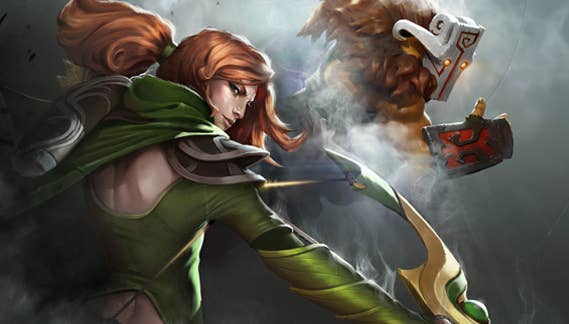
The other thing I'm not particularly enamored with is the lack of tools available to the players to deal with AFK-ers and disconnects during a game. I've had more than a few games that have been ruined by players copping out at the merest whiff of things going wrong – or simply giving up and sitting at home base, leaving everyone else to pick up their slack. There's a system in the game that downrates AFK/ inactive/disconnected players – but based on my experiences, it's a feeble deterrent. Last night I had three games in a row where AFK'ers ruined each game, and while the option to "safely disconnect" from a game whose players are leaving and quickly join a new one is useful, it's not really solving what I see as an issue for DOTA – and that's players giving up way too easily and wasting everyone else's time.
I think a player-driven vote-out system would work well to cure this, but it seems that this sort of functionality is a concern to DOTA's creators due to potential abuse. However, I've seen this working very effectively in World of Warcraft, so I can't see why it wouldn't work here. Failing that, perhaps an option that lets players step in to a game in progress that someone else has left – perhaps with an extra incentive if they help their team win? Whatever the solution, pretty much anything would be better than a system that doesn't effectively deal with other players basically wasting your time repeatedly.
PvP matchmaking and tools complaints notwithstanding, DOTA is still a terrific game. When players work together against a similarly skilled team, the result is a dynamic, involving and nuanced tactical battle, and I've definitely had a few great matches – not all of which I've won. But like all pick-up PvP games, there are also frustrating moments where you can get absolutely flattened, or end up stuck in a team with a couple of nutjobs who're off their meds.
If those sorts of moments are not for you, then you already know DOTA 2 isn't something you should subject yourself to. But if you're of hearty PvP stock, thick of skin, stoic of nature, and moderately understanding of the human condition, DOTA 2 is a must. It really is a fantastic game.
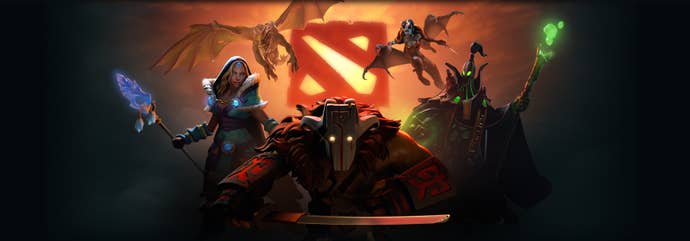
Cassandra Khaw, Content Editor
The most important thing to remember about DOTA 2 is this: it's not about winning, it's about losing stylishly to progressively more back-breaking, marrow-sucking odds. Every victory here is a Pyrrhic victory, another step deeper into a spiraling RTS-flavored addiction. You'll never be good enough, Valve's absurdly-popular-Warcraft-III-mod-with-a-new-paint-job hisses as it tweaks your placement on the matchmaking ladder ever-so-slightly. Never enough to scare you away from the sport, of course, but enough to make that next fix you're clamoring for just that much harder to attain.
On the surface, Dota 2 looks innocent enough. Ten players get into groups of two. Each team, with the help of their NPC 'creeps', must then traverse at least three projectile-spewing monuments in order to reach the opposition's base. After that, it's a question of breaking down the barracks (because your troops turn into perma-roided versions of themselves when the enemy has no place to sleep) before finally bringing down the other's Ancient. Taken at face value, Dota 2 probably doesn't seem very deep. But then again, chess wouldn't appear incredibly intricate either if you were to view it as a board with funny pieces.
The best and worst thing about Dota 2 is that it never quits trying to get a rise of you. In the beginning, your only concerns are usually things like, 'I hope I don't die too many times this match' and 'Man, I hope my friends are not embarrassed.' However, it'll eventually escalate. Once you've gotten into the rhythm of survival, which often involves avoiding the rhythms of the Night (Stalker), you begin cogitating on how best to schedule your abilities, how to last hit, to deny, to maximize the usage of your hard-earned gold. You learn about the subtleties behind ward placement, team compositions, the kind of carries you should sacrifice your virtual existence for and the kind you should never, ever play with again. To put it another way, Dota 2 has a way to ensuring that you never stop learning, that you ever stop encountering reasons to indignantly ask Google, 'Why?'
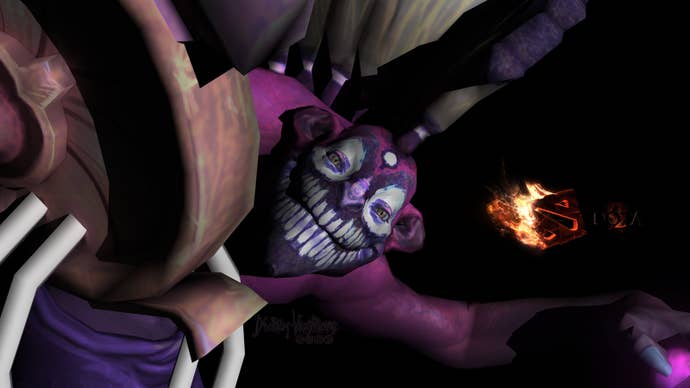
And that's why I love it. Ten years after my best friend convinced me that a Smurf-blue satyr was going to be my soulmate, I'm still finding myself in this game, still elbows-deep in research, still mapping out the optimal way to keep everyone alive when they're drunk, asleep on the keyboard, or just plain terrible at the game. Dota 2 can sink its claws into you in a myriad of ways. For me, it was that epiphanous moment when I realized that I'm never going to beat it. With many other titles, there's a vague sense of impending finality. At some point, you'll understand everything that there is to know and then that'll be that. The make-up will come off, the tailored suit and the whalebone-corset removed to expose the unglamorous insides. Mundanity will set in. But not here, not with DOTA 2. Even if you could, hypothetically speaking, become a mouse-melting maestro who can pick any Hero and carry the entire team alone, you'll still need to figure out how to beat Dendi. http://dota2.gamepedia.com/Dendi
So, is this where you rush out and install the game?
Maybe. Just maybe. Before you do that, you should probably ask yourself: do you have a temperament like stone-cold granite? Games like Dota 2 tends to engineer a culture of rage. People, myself included, get angry when they play Dota 2. I have, at least once, muted myself on Skype so I could ululate in wordless, frothing fury at my screen. (I got waylaid by an idiot Naga Siren who thought her ultimate was a better bet than my Tidehunter's Ravage. Grr, I say. Grr.) In person, I'm told that I can be inappropriately meek but there's something about Dota 2 that teases out the worst in people. If unpleasant vernacular and flaring tempers are things you much rather not deal with, Dota 2 can be potentially be a risky bet -
Who am I kidding?
Play it anyway. Should the idea of interacting with human players dismay you, play Dota 2 without them. Make it a single-player experience or a co-operative assault against the bots. Play it because even if Dota 2 is at its best when served with a side of competition, the amount of polish that Valve has lavished over the game makes the whole experience worthwhile regardless. Heroes in Dota 2 are almost uncannily well-fleshed out. They're equipped with great designs, great voice acting and an armory of great lines. Tidehunter will regale you with the status of his appetite while the masked Juggernaut makes terrible puns about clay vessels. If you have the Stealth Assassin pick up an invisibility rune on a sojourn on the river, he'll tell you, with dry disapproval, that that was rather redundant. In spite of the setting (an eternal battlefield that not even death can provide escape from), some of the witty banter feels almost like sitcom-styled zings. It's outrageous yet strangely not out-of-place in this blood-soaked field. Long story short, Dota 2 is a nest of clever little design choices and good decisions that you should play because everyone needs that one thing they can constantly cut their teeth against.
Or it could just be a transcendent iteration of decades-old Warcraft III mod filled with the most cantankerous players this side of Tatooine, the kind that makes you want to swear off video games, curl up into a ball and cry yourself quietly to sleep.
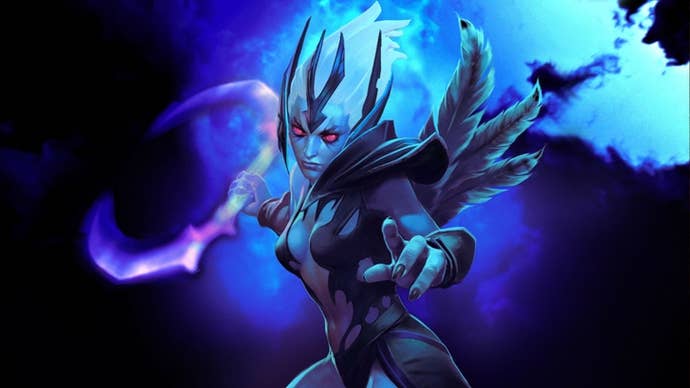
The Nitty Gritty
- Visuals: Solid, details and stylish. Nothing that'll tax your graphics card, and nothing to write home about – but good enough.
- Music: It's fine. Just fine. Like someone went out and bought the rights to decent off-the-shelf movie soundtrack and tinkered with it.
- Interface: A well structured tutorial eases you into the action, but otherwise the general presentation and layout ticks all the boxes for functionality, but doesn't win any awards for aesthetics.
- Lasting Appeal: The sky's the limit on this one. There's huge scope to improve your skills and learn new characters and roles, and when everything comes together, the competitive aspect of this game is absolutely first class. Which is why people play DOTA 2 for thousands upon thousands of hours.
ConclusionA great PvP game that offers some of the most intriguing and nuanced team combat around. As with all multiplayer games, sometimes the enjoyment can be marred by less considerate players, but when everyone is giving it their all, DOTA 2 is intense, challenging, and hugely enjoyable.
